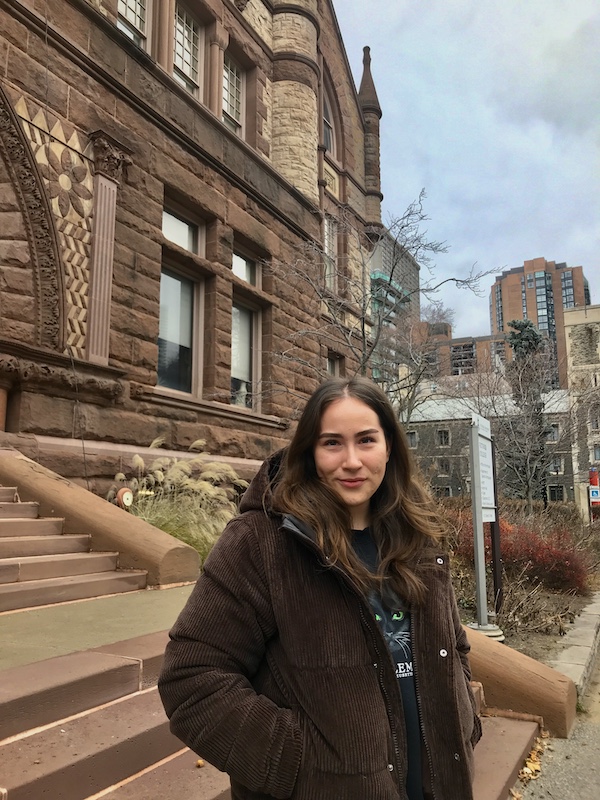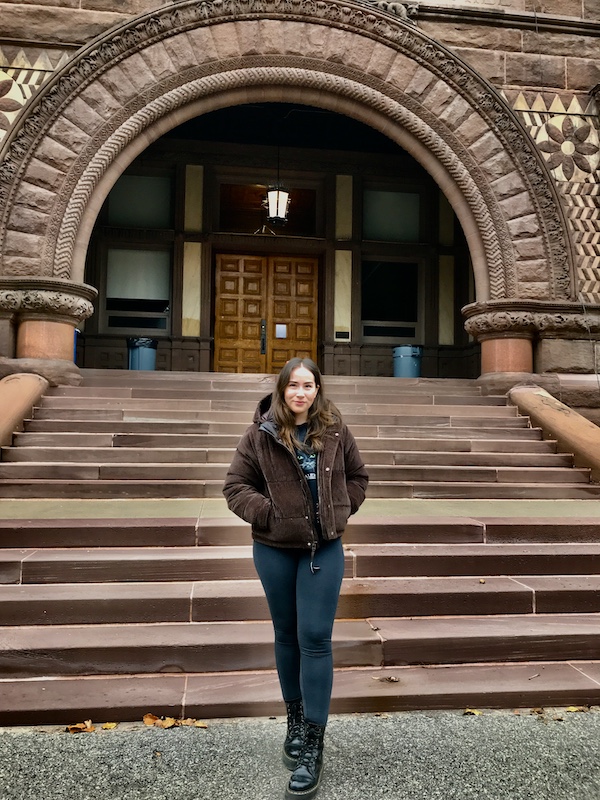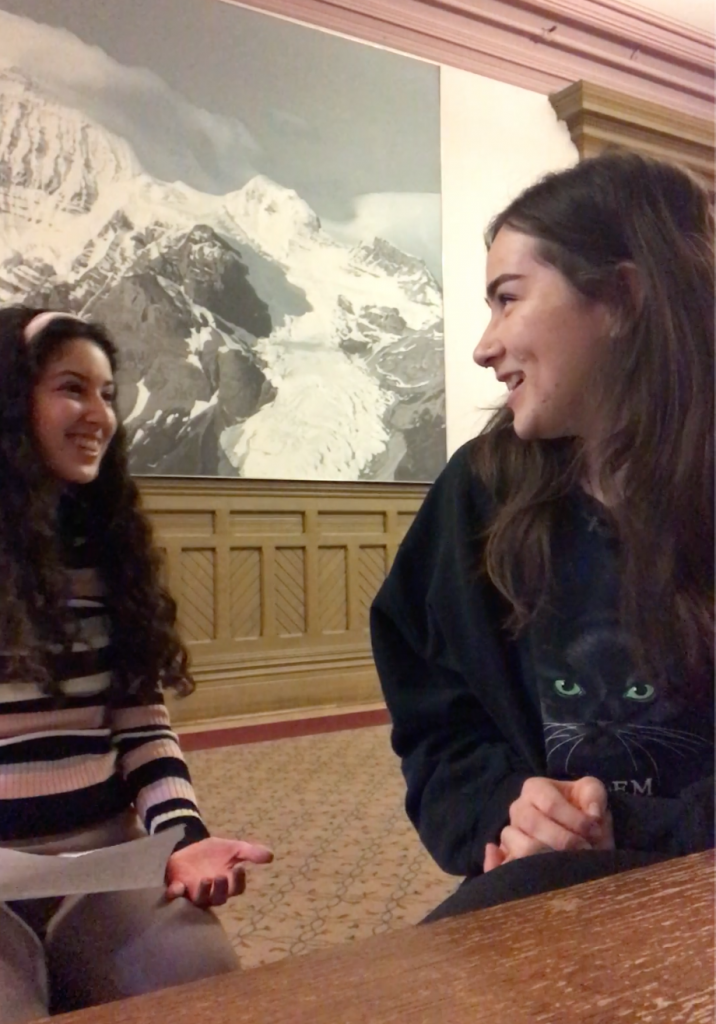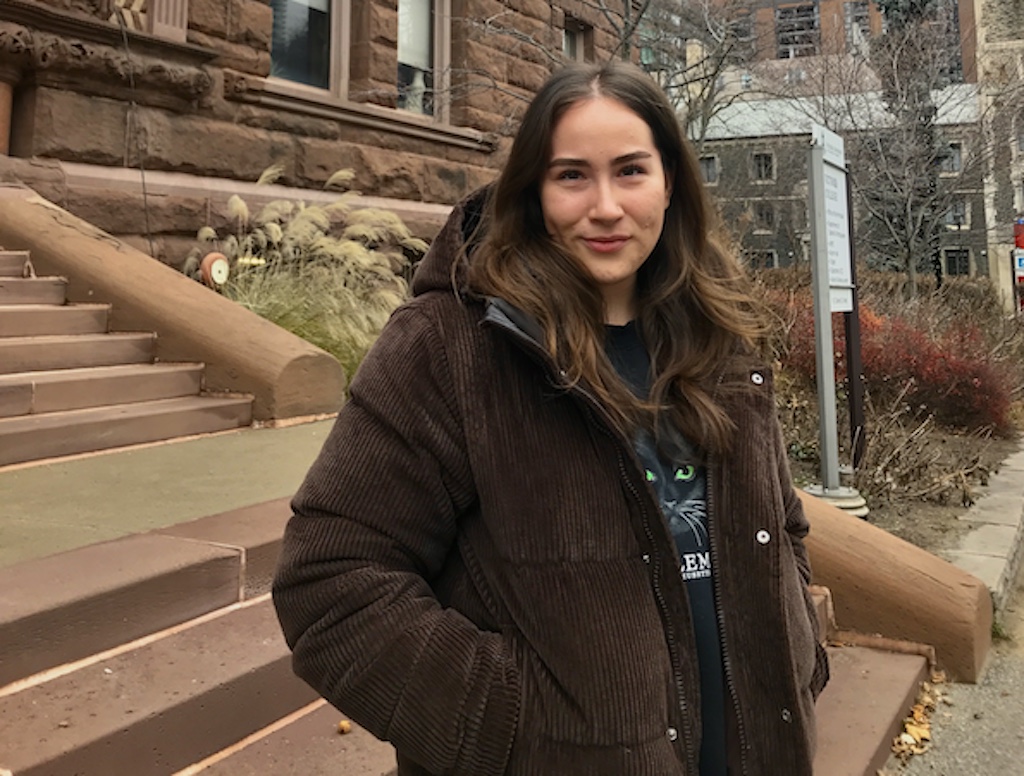By now you may be familiar with the name Iakoiehwáhtha (Iako) Patton, a fourth year Art History student, president of the Art History Student Union, who is now making history herself by being the first First Nations female in Canada to be selected to receive the most prestigious postgraduate scholarship in the world; the Rhodes Scholarship to study at the University of Oxford.
Through an interview with Patton, we got the insider scoop on this accomplishment and wise advice that students of all years and fields can learn from.

Sammi: So what exactly does it mean to be a Rhodes Scholar for students who don't know about what exactly it is?
Iako: For me going into it, I had this really vague idea of what a Rhodes Scholar was, and it was somebody who was really well vested in the political life on campus, somebody that was in the medical field. So I had a really narrow view of what a Rhodes Scholar was, and I didn't think that really extended towards the humanities and art history particularly. I'm very passionate, insanely passionate about what I study, which is art history, but I think that's what makes a Rhodes Scholar. It's somebody who is insanely passionate about what they study, and they pursue that to the fullest extent of their abilities, and they take what they study and kind of extrapolate that to this worldwide venue and see how they can really help the world and humanity and better people's lives with what they study. And for me, that was art history.
Sammi: Is this a goal you've always had?
Iako: I like to say that I stumbled into art history. I began studying psychology in school. And I really loved psychology. It was something that I was really fascinated with. But it wasn't until I took an art history course as an elective that I realized, I can bridge these two subjects that I love, which was art and history as just secondary subjects that I like to study. And realizing that I could actually bridge them together as one discipline was so profound. I was like, yeah, this is what I'm going to dedicate my entire life to.
A piece of advice that I would give anybody is take classes that are outside your immediate field of study, because that was so pivotal for me.
Sammi: What do you value most about the Rhodes Scholarship?
Iako: The community. I've heard from other people that I've talked to that the community was such an intrinsic part of the scholarship. And I didn't realize how big that was, until I actually announced that I was going to be a Rhodes Scholar. And the support from current scholars and residents and previous alum that reached out to me was so nice. It was so welcoming. And they were so helpful with answering so many of the questions that I had, from dealing with interviews and stuff like that, because it's nerve racking, right? Also course selection, the whole application to Oxford afterwards. There's so many little questions and big questions that I had that kept on coming at me going through the entire process from the interview to actually being accepted as a Rhodes Scholar. The community has been incredible.
Sammi: You are also making history yourself being the first Indigenous Canadian to receive this scholarship. So what impact do you think that will have on your community and Indigenous youth?
Iako: I'm the first female First Nations Rhodes Scholars. So there was, I believe, a Metis woman in the 80s. The numbers are not kept so well on that. But, I've been the first in so many aspects of my academic journey, but also in these leadership positions that I've held, especially in my scholarship. I didn't have a lot of Indigenous role models to look up to in academia, especially in art history. It wasn't until this year that I realized there were Indigenous art historians and it was only through deliberate research into my field. So holding the title of first in anything is, I know the weight of that. And I know that people, are watching, but also that means that I have the opportunity to pave that road, not only for myself, but for other Indigenous scholars, but also Indigenous female scholars, that's really important, because there is, unfortunately, a void in academia for Indigenous women, specifically in art history. So if I can be the first to pave that road for myself, but also for those looking to get into the field, then I'm so happy to do so because it was so important to me to have role models in academia. If I can be of help to anybody else, then that's all I could ask for.
Sammi: You also paved the way for yourself being a first generation university student. How has that impacted your university life and the challenges that maybe came with that?
Iako: Oh, absolutely. Yeah, my parents didn't attend university. And there's a lot of reasons for that. You know, there's the barriers to education for Indigenous communities, especially on reserve communities, I came from a reserve. So moving to U of T was such a huge culture shock. But from the moment that I first stepped into elementary school, my parents were really big advocates for my education, and I am so grateful for that. And they really pushed me to pursue my education to the absolute fullest of my abilities, and they really instilled the value of education for me. And I took that and kind of ran and I knew that going to U of T coming out of my community, and moving that was a really big step. But with that big step, I knew that, I'm going to take this seriously.
I definitely took my education as the most important aspect of my life within the last few years. And my education is really, really important to me.
Sammi: How did you take advantage of being at U of T to the fullest and able to balance having extracurriculars and keeping grades up?
Iako: I've been the president of the Art History Student Association for the last two years. And I really like making events for students. That's something that's really really fun for me, because then I get to socialize. But it's really hard to manage all of that. So my calendar is kind of scary. Which I think that's a really big aspect of how I've kept myself on track, just having a calendar. And sometimes it's intimidating looking at because I'm booked months in advance. But there's no other way that I would be able to actually manage my life if I didn't have an extensive calendar.
Sammi: How do you see yourself in the future, do you have five years from now a vision of where you want to be or what you want to be doing?
Iako: I did before the Rhodes Scholarship. It's completely changed my entire trajectory, and in the best possible way, obviously. But applying to graduate schools before being given this opportunity, I was really looking at schools that would give me funding because graduate school is expensive. And most of those for the art history field are PhD programs, direct entry. And I wasn't sure if I wanted to go directly into a PhD. It's really, it's stressful. It's a huge jump, especially if you haven't taken graduate classes in the undergraduate level, or take doing your masters beforehand. It's a really big jump in changing like just your mindset or the way that you think about your work as a graduate student versus an undergraduate student. So I really had to grapple with what I wanted to do, and I kind of had a path that I was potentially going down and this kind of completely changed that trajectory. But in the best way, and everybody that I've talked to who has been a Rhodes Scholar or works in the academic realm, has said that this opportunity really opens doors to opportunities that you can't even fathom existing. I have goals and aspirations. But I don't want my life to be like checklists.
Sammi: How do you think, other U of T students can open themselves up for opportunities like this? I feel like the idea of applying to a big scholarship like that is very intimidating. I bet a lot of students wouldn't think to apply.
Iako: I almost didn't, I almost didn't apply, because we all have this idea of what a Rhodes Scholar is, again, I thought it was people in the Political Science and the medical field. And that is true, there are so many great people that I know, currently who are Rhodes Scholars in those fields. But that's not all that it is. And if you're an architecture student, and you're a humanities student, and an art history student, and you're in the social sciences, just go for it apply, and the worst thing that could happen is they say no, right? And then that's just oh, you can put that on your resume.
You know, it's a really great opportunity, just going through the process. And going through the interview, I told myself that any interview I do after this I'm set because it was really stressful. That is one of the biggest interviews that I think that I will ever do in my life.

Sammi: What was the interview like? Was it online or in-person?
Iako: It was in person, and you're surrounded by a panel of people. And it's a huge panel, and there are people very specialized in their field. They take so much time to go through your resume and your application materials. It feels like they know you better than you know yourself at some points with the questions that they ask, but it's very intimidating. But that experience is one that I wouldn't trade for anything because it really prepared me and made me think about my own studies and my own goals and what I'd want to do if I wasn't to get this, right, so in that way, it's it was a really rewarding experience, regardless of the outcome.
Sammi: What do you think prepared you for an interview like that, like the things that you have that helped get you ready for something like that?
Iako: U of T was incredible in preparing me. I sat down with so many people that were willing to do mock interviews with me. I wrote down questions with my answers recorded myself seeing them multiple times, like going through in these recordings started as 20 minutes. 30 minutes, 45 an hour? And I would listen to them on repeat.
Sammi: So next year, you start at Oxford, so how does that work exactly? You're studying art history there? Is it going to be more research based?
Iako: It's a nine month program. So it's actually very short. And it's a master's in Art History and Visual Culture. So you get those two elements coming, visual culture is art history, art history is visual culture. I'm so excited about it, and the faculty there are incredible. So, regardless of who my advisor will be, because I'm going to be doing a term paper at the, the second term. So that's kind of equivalent to a thesis from my understanding, but regardless of who my advisor is, I know I'm going to really love the experience there. Yeah, I'm so excited to meet everybody else that's going to be in the Rhodes program as well. The other candidate, the other scholar, Rishi Bansal, he's incredible as well, so I can't wait to go on this journey with him and then meet everybody else from Canada. I've had quite a few people who reached out as well. We're all from very different fields as well. So that's really exciting because then you learn from different people, different backgrounds, different world views.
Sammi: And I know you've also been doing research at U of T, what exactly is that like?
Iako: So I've been working actually at St. Mike's, this is my third year, I believe, working under a professor Reid Locklin, who's a professor in comparative religion. And he created this project in kind of dialogue to the Call to Action for residential schools and residential school survivors. And I started working on the site, talking about land, and how land is really intrinsic to Indigenous identity and how the loss of land has kind of contributed to colonization. And there's so many different areas that this could lead into, and I've kind of bridged that research with my art history research. So I started looking at the Group of Seven and they had this whole presentation that I presented at a conference this past summer as well. And it was called the absent landscape. So I looked at the Group of Seven and how their landscapes have an absence of Indigenous people, and how that contributes to this history of colonialism and it was really interesting.
Sammi: How did you discover all these opportunities at U of T ? Did you just find it, did you look for research ? How did you come about all that?
Iako: It's a lot of talking with your professors, because I know speaking with your professors outside of the classroom hours, is really intimidating. I kind of think of it as they're like, your boss. They're like a colleague, but superior position, right? Just think about it like that and I swear, the stress levels go down a little bit. So I talked to a few of my professors, and I was looking for ways that I could advance research opportunities. And I talked to somebody at Vic and they put me in contact with Professor Locklin, and he's like, Oh, wow, I really like your avenue of research, I think it's quite outside the field of comparative religion, but with my background and my identity as an Indigenous person in the way that I've approached my research in the past, I think that we really have worked well together. So that's how I got into that kind of realm of research. But it really is like talking to your profs, making those connections outside the classroom and getting involved in organizations or student unions. I know quite a bit about research opportunities, just through being in the art history department, and you know, lingering. So people who are looking for research opportunities and just ways to get involved, go to your student unions, because they definitely have some insights.
So yeah, go to your student unions, I'm sure they know professors who are looking for research assistants or there's organizations outside the university who are looking to hire. Sometimes you can get credit for them. So that's also an option.
Sammi: Now you embark on this next journey of your life? Is there any advice that you're carrying with you, something that's you're going to keep in the back of your head as you take on this next journey? What's on your mind as you finish up?
Iako: So much is on my mind. I mean, I'm finishing classes right now, so a lot is on my mind. But I think just being open to opportunities, this was an opportunity that I kind of had to force myself to be open to because I mean, it's such a big thing to apply to. You kind of have to disconnect yourself from it a little bit. Just you know, if you don't get it, I didn't want to be too hurt about it. But if I didn't apply for it, then I wouldn't have known the outcome. So I think just in that, you know, that you've got to be open to different opportunities for sure.
Sammi: Is there anything else to your fellow students that you would want them to take away from your experience and learn from?
Iako: Don't be afraid to get involved. I know that it's really intimidating. And I'm sure you can vouch for this just being on the social media and what not. It can be a little bit intimidating, especially like it when you're working. I know I've worked in social media a little bit as well, people knowing your face. But I think you become such a recognizable face that people see you as a parallel to your work, right. And I think that can be a good thing, at least for me, right? I'm the face of the Art History Student Association. And I'm really proud of that. Yeah, I'm really proud of the work that I've done on that. And if I didn't put myself out there, then I wouldn't be in the position that I am now. So I get involved. I think that's really the big one. Yeah, for sure.
Sammi: Anything else about the Rhodes Scholarship that you want to share, what are you most excited about or anything else that you'd want to share?
Iako: I'm just so excited to be in the UK. I'm so excited to go to all the museums, that's like the big one. As soon as I sat down to kind of figure out my plan for this I was like, okay, well, what museum am I going to hit in the first week I'm there.
If one person looks at my story and says to themselves, yeah, I can do something similar. I can do exactly that. Then that's it. That's all I'm here for.

––Sammi Herlich

0 comments on “Making History: Iakoiehwáhtha Patton receives the Rhodes Scholarship”